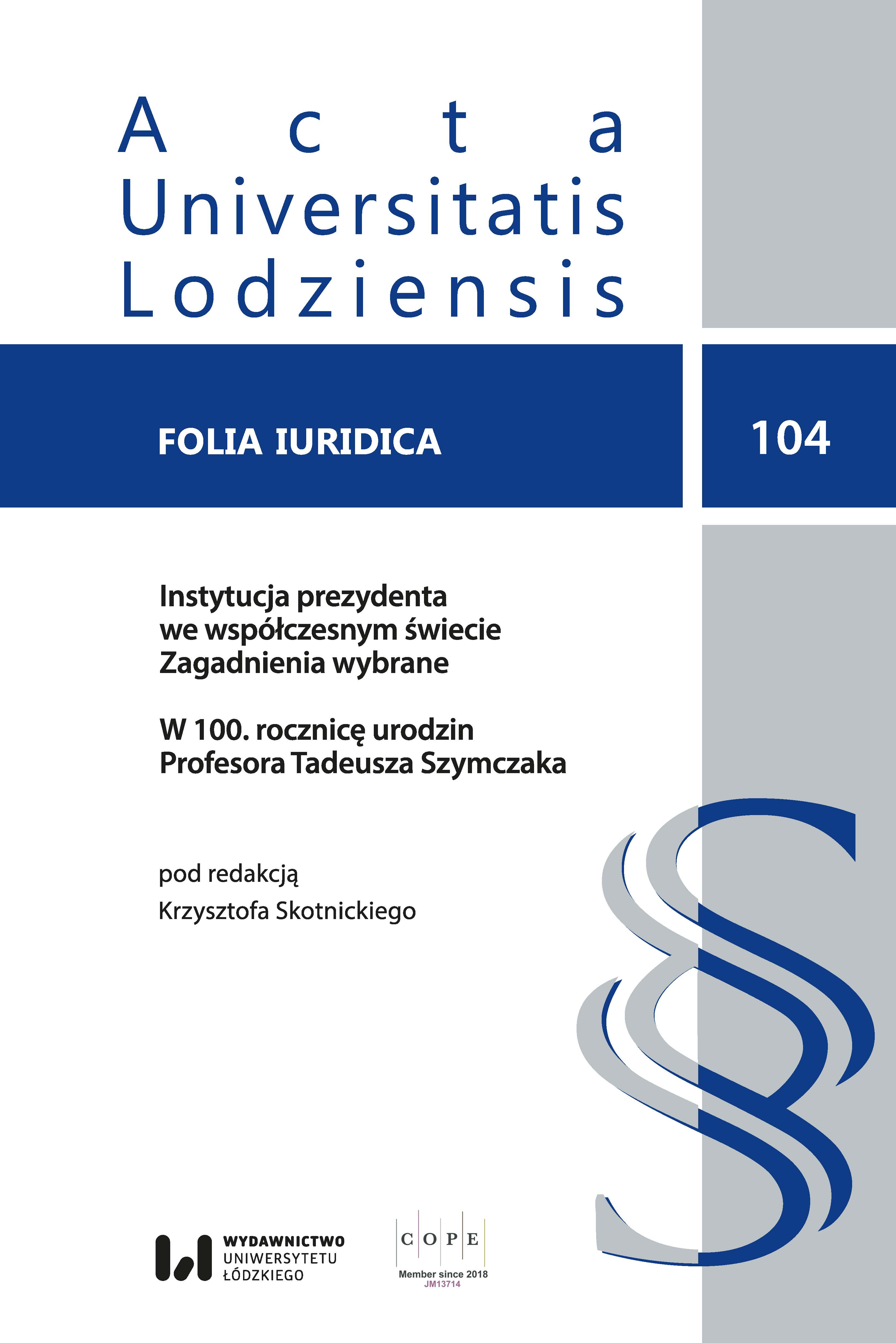The President of the Republic of Poland as the guardian of the constitution
DOI:
https://doi.org/10.18778/0208-6069.104.10Keywords:
President, constitution, guardian of the constitution, observance of the constitutionAbstract
Pursuant to Art. 10 and 126 of the Constitution of the Republic of Poland, the President is not only the organ of the executive authority, but also the authority representing the state and the authority executing the so-called arbitration. Assigning the role of the guardian of the constitution to the President falls within his role as an arbiter. The idea of entrusting the president with the function of the organ protecting the constitution was repeated in the drafts of the constitution, which the National Assembly worked on in the years 1994–1997. The provision of the Constitution that the President shall ensure observance of the Constitution means that he is to be the guarantor of constitutional axiology, which may be expressed in the exercise of various powers. Finally, the President – as the guardian of the Constitution – is himself in a special way obliged to comply with its provisions. It is obvious that the President of the Republic of Poland, as the arbiter upholding the values and norms of the Constitution, cannot himself violate the fundamental law.
Downloads
References
Borkowski, Tomasz. 1997. „System rządów w nowej Konstytucji”. Państwo i Prawo 11–12: 71–85.
Google Scholar
Chruściak, Ryszard. Red. 1997. Projekty konstytucji 1993–1997. Cz. 1 i 2. Warszawa: Wydawnictwo Sejmowe.
Google Scholar
Czarny, Piotr. 1997. „Prezydent Rzeczypospolitej”. W Prawo konstytucyjne. 210–234. Red. Piotr Tuleja. Warszawa: C.H. Beck.
Google Scholar
Górecki, Dariusz. 2019. „Prezydent Rzeczypospolitej Polskiej”. W Polskie prawo konstytucyjne. 203–220. Red. Dariusz Górecki. Warszawa: Wolters Kluwer.
Google Scholar
Granat, Mirosław. 2007. „Konstytucja RP na tle rozwoju i osiągnięć konstytucjonalizmu polskiego”. Przegląd Sejmowy 4: 11–33.
Google Scholar
Jamróz, Adam. 2013. „Status konstytucyjny Prezydenta RP w świetle funkcji określonych w art. 126 Konstytucji (propozycje wykładni)”. W Aktualne problemy reform konstytucyjnych. 77–104. Red. Stanisław Bożyk. Białystok: Wydawnictwo Temida 2.
Google Scholar
Kallas, Mirosław. 1997. Konstytucja Rzeczypospolitej Polskiej. Warszawa: Wydawnictwa Prawnicze PWN.
Google Scholar
Ludwikowski, Rett R. 2000. Prawo konstytucyjne porównawcze. Toruń: TNOiK „Dom Organizatora”.
Google Scholar
Masternak-Kubiak, Małgorzata. Jan Trzciński. 1997. „System rządów w Konstytucji Rzeczypospolitej Polskiej z 2 kwietnia 1997 r. – analiza kompetencji Sejmu”. Przegląd Sejmowy 5: 45–55.
Google Scholar
Mojak, Ryszard. 1997. „Pozycja ustrojowa Prezydenta RP w świetle nowej Konstytucji”. Państwo i Prawo 11–12: 54–70.
Google Scholar
Mojak, Ryszard. 2003. „Zasada parlamentarnego systemu rządów”. W Polskie prawo konstytucyjne. 132–148. Red. Wiesław Skrzydło. Lublin: Morpol.
Google Scholar
Sarnecki, Paweł. 1995. „Władza wykonawcza w Małej Konstytucji”. Państwo i Prawo 4: 3–13.
Google Scholar
Sarnecki, Paweł. 1999. „Komentarz do art. 126”. W Konstytucja Rzeczypospolitej Polskiej. Komentarz. T. 1. Red. Lech Garlicki. Warszawa: Wydawnictwo Sejmowe.
Google Scholar
Sarnecki, Paweł. 2000. Prezydent Rzeczypospolitej Polskiej. Komentarz do przepisów. Kraków: Kantor Wydawniczy Zakamycze.
Google Scholar
Skrzydło, Wiesław. 2002. Ustrój polityczny RP w świetle Konstytucji z 1997 r. Kraków: Wolters Kluwer.
Google Scholar
Skrzydło, Wiesław. Ryszard Mojak. 2001. „The Presidency in Poland”. W Ten Years of the Democratic Constitutionalism in Central and Eastern Europe. 291–302. Red. Kazimierz Działocha, Ryszard Mojak, Krzysztof Wójtowicz. Lublin: Morpol.
Google Scholar
Sokolewicz, Wojciech. 1993. „Rozdzielone, lecz czy równe? Legislatywa i egzekutywa w Małej Konstytucji 1992 roku”. Przegląd Sejmowy 1: 28–48.
Google Scholar
Szczucki, Krzysztof. 2016. „Komentarz do art. 186”. W Konstytucja RP. T. 2: Komentarz do art. 87–243. Red. Marek Safjan, Leszek Bosek. Warszawa: C.H. Beck.
Google Scholar
Szczurowski, Bartosz, 2016. Prezydent Rzeczypospolitej Polskiej jako organ czuwający nad przestrzeganiem konstytucji. Warszawa: Wydawnictwo Sejmowe.
Google Scholar
Wawrzyniak, Jan. 1999. Zarys polskiego ustroju konstytucyjnego. Bydgoszcz: Oficyna Wydawnicza Branta.
Google Scholar
Witkowski, Zbigniew. 2002. „Wybrane zasady prawa konstytucyjnego Rzeczypospolitej Polskiej”. W Prawo konstytucyjne. 308–335. Red. Zbigniew Witkowski. Toruń: TNOiK „Dom Organizatora”.
Google Scholar
Wojtyczek, Krzysztof. 2002. „Prezydent Rzeczypospolitej”. W Prawo konstytucyjne RP. 288–306. Red. Paweł Sarnecki. Warszawa: Wydawnictwo C.H. Beck.
Google Scholar
Wróbel, Sylwester. Ryszard Glajcar. 2003. „Instytucja Prezydenta w świetle Konstytucji Rzeczypospolitej Polskiej z 2 kwietnia 1997 r.” W Instytucja prezydenta i wybory prezydenckie 2000 roku. Studia i szkice. 7–23. Red. Sylwester Wróbel. Bielsko-Biała: Wydawnictwo Wyższej Szkoły Ekonomiczno-Humanistycznej.
Google Scholar
Zięba-Załucka, Halina. 2005. „Instytucja Prezydenta Rzeczypospolitej Polskiej”. W System organów państwowych w Konstytucji Rzeczypospolitej Polskiej. 75–79. Red. Halina Zięba-Załucka. Warszawa: LexisNexis.
Google Scholar
Konstytucja Rzeczypospolitej Polskiej z dnia 2 kwietnia 1997 r. (Dz.U. z 1997 r. Nr 78 poz. 483 ze zm.).
Google Scholar
Ustawa konstytucyjna z dnia 23 kwietnia 1992 r. o trybie przygotowania i uchwalenia Konstytucji Rzeczypospolitej Polskiej (Dz.U. z 1992 r. Nr 67 poz. 336 oraz Dz.U. z 1994 r. Nr 61 poz. 251).
Google Scholar
Wyrok TK z dnia 3 grudnia 2015 r., K 34/15, OTK-A 2015, nr 11, poz. 185.
Google Scholar
Wyrok SN z 7 kwietnia 1998 r., I PKN 90/98. http://www.sn.pl/sites/orzecznictwo/Orzeczenia1/I%20PKN%2090-98.pdf (dostęp: 26.07.2023).
Google Scholar
Downloads
Published
How to Cite
Issue
Section
License

This work is licensed under a Creative Commons Attribution-NonCommercial-NoDerivatives 4.0 International License.














